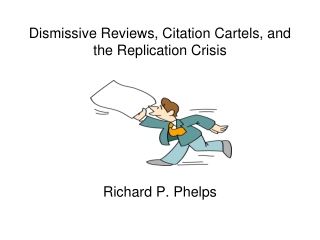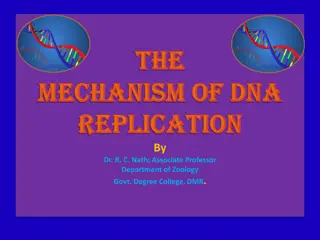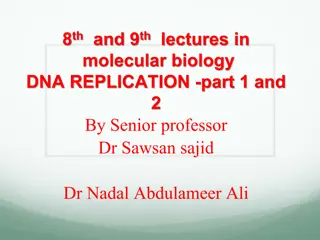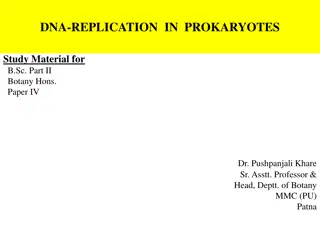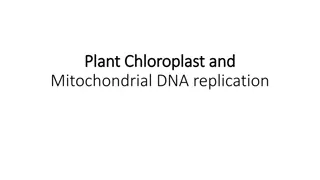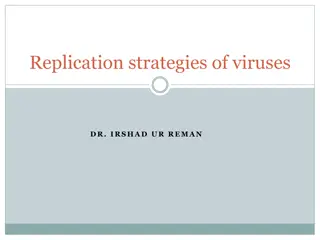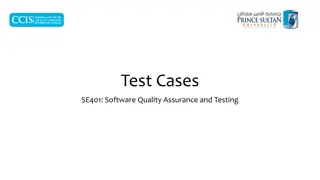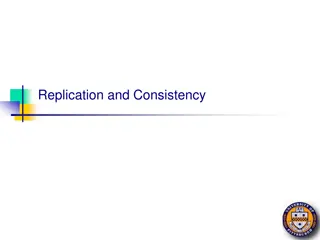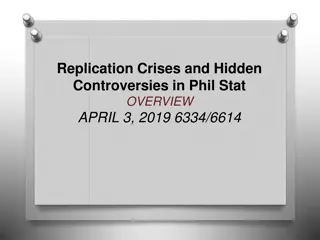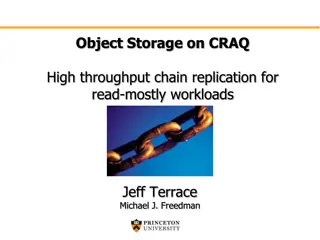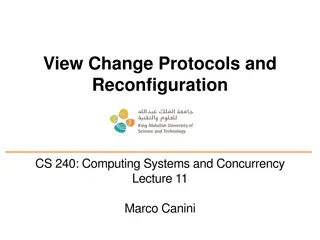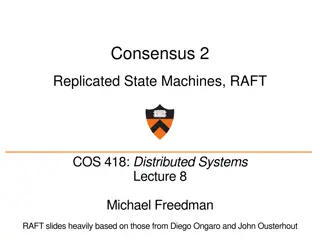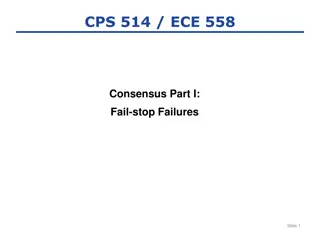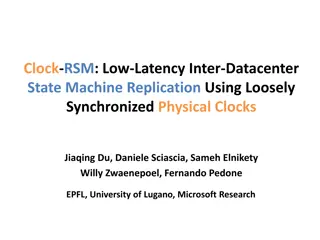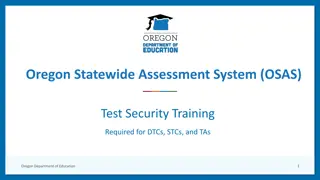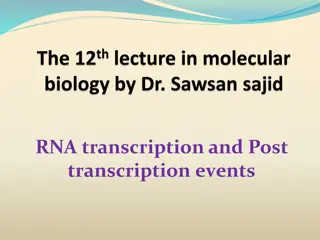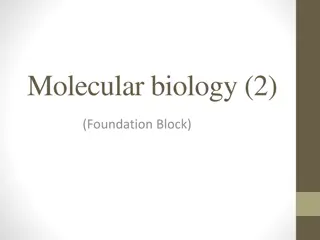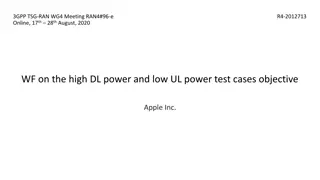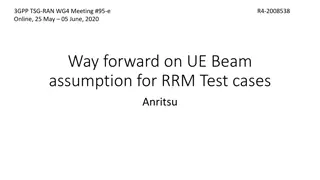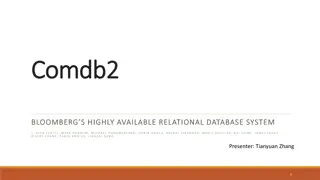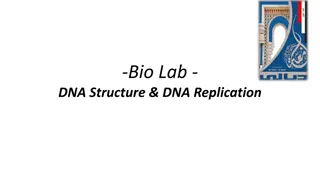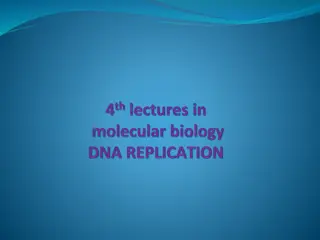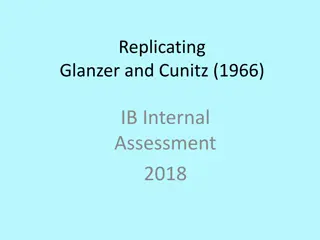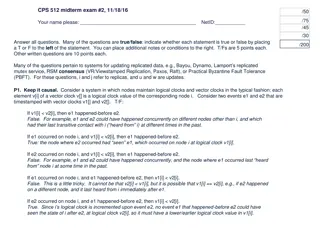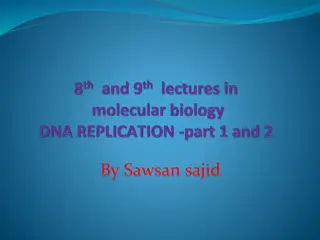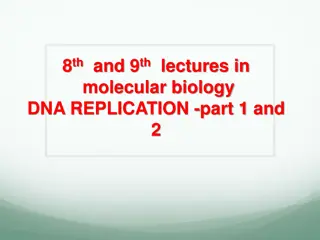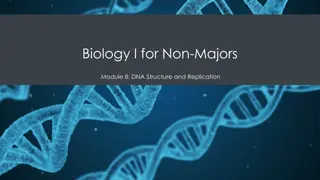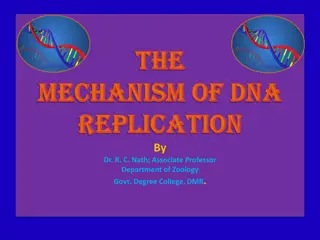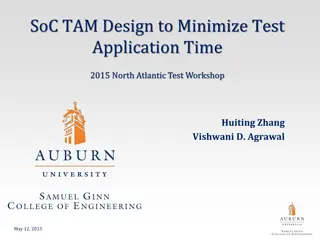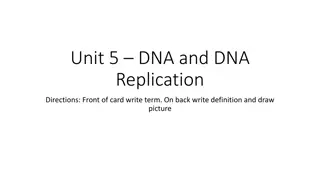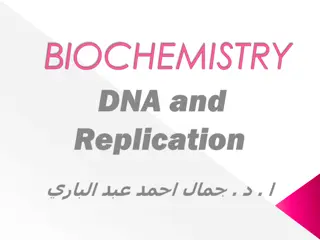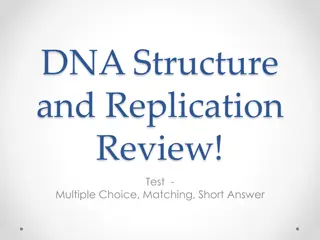Data Director Replication Best Practices
Explore best practices in data replication using methods like SQL, Web Services, and SaaS architecture. Learn about distribution, security, and central versions. Gain insights into replication processes and strategies.
1 views • 62 slides
Dismissive Reviews, Citation Cartels, and the Replication Crisis
The study delves into the replication crisis in research, citing factors influencing research credibility such as sample size, effect size, and financial interests. It highlights issues like gaming the system, P-hacking, and data sharing reluctance. The growth of Metascience as a response to these c
0 views • 45 slides
Understanding the Mechanism of DNA Replication
Explore the intricate process of DNA replication, as elucidated by renowned scientists like Dr. R. C. Nath and Nobel laureate Arthur Kornberg. Delve into the essential enzymes, proteins, and basic rules involved in the replication of genetic material, shedding light on initiation, elongation, and te
3 views • 22 slides
Ultimate Guide: How to Prepare for Hitachi Vantara HQT-6713 Certification
Start Here--- \/\/bit.ly\/3UEhsvm ---Get complete detail on HQT-6713 exam guide to crack Hitachi Vantara Qualified Professional - In-system replication management. You can collect all information on HQT-6713 tutorial, practice test, books, study material, exam questions, and syllabus. Firm your know
2 views • 17 slides
Effective Strategies for Overcoming Test Anxiety
Learn practical methods to combat test anxiety in this 1-hour workshop by CCAMPIS Kayla Taylor. Topics covered include avoiding test anxiety, preparing effectively for tests, identifying and reducing sources of anxiety, quelling anxiety, test-taking strategies, and stress management. The PASS method
0 views • 13 slides
Advanced Clinical Practice Framework and Pillars of Practice
The document discusses the advanced clinical practice framework and the four pillars of practice which include leadership & management, clinical practice, education, and research. It emphasizes the importance of core capabilities and area-specific competence in advanced clinical practice. The role o
2 views • 8 slides
Understanding DNA Replication Process: Insights and Mechanisms
DNA replication is a crucial biological process where identical copies of DNA molecules are produced for cell division. Initiated by specific proteins, it involves stages like initiation, elongation, and termination. Enzymes like helicases and DNA polymerase play key roles in forming replication for
0 views • 33 slides
Understanding DNA Replication in Prokaryotes for B.Sc. Botany Hons. Students
Study material on DNA replication in prokaryotes focusing on key concepts like semiconservative mode of replication, involvement of enzymes, different models for understanding replication, and the bidirectional nature of DNA replication in prokaryotes. The material covers the process steps including
0 views • 33 slides
Plant Mitochondrial and Chloroplast DNA Replication Mechanisms
Plant mitochondria and chloroplasts have intricate DNA replication processes. Mitochondrial DNA replication is independent of the plant cell cycle and is associated with specific proteins in nucleoid complexes. Plant mtDNA contains more genes than animal mtDNA, with a complex structure involving int
1 views • 16 slides
Viral Genome Replication Strategies and Mechanisms
Viruses utilize different replication strategies to ensure the replication of viral genomes, packaging into virions, and potentially altering the host cell's structure or function. These strategies are vital for the virus to operate effectively within the host cell's constraints. The replication pro
0 views • 15 slides
Understanding Software Testing: Test Cases, Selection, and Execution
Software testing plays a crucial role in identifying and resolving issues within software products. Test cases, selection, and execution are fundamental aspects of the testing process. Test cases define conditions for testing software functionality, with a focus on repeatability and data specificity
2 views • 36 slides
Understanding Replication and Consistency in Computer Systems
Explore the concepts of replication and consistency in computer systems, discussing the benefits and challenges of using replicas for reliability, performance, and scalability. Learn about object replication problems and solutions, and the importance of maintaining consistency in shared data access.
1 views • 26 slides
Understanding Coagulase Test in Microbiology
The Coagulase test is a crucial microbiological method used to differentiate Staphylococcus aureus (Coagulase Positive) from other Staphylococci (Coagulase Negative). By detecting the presence of the enzyme coagulase, this test helps identify pathogenic strains of Staphylococcus that can cause serio
2 views • 28 slides
Addressing Replication Crises and Hidden Controversies in Phil.Stat
High-profile failures of replication have sparked debates on reforming statistical methods in science. Hidden controversies include Statistics Wars, Replication Paradoxes, and underlying assumptions. Significance tests and p-values play crucial roles, but proper interpretation is essential to avoid
0 views • 48 slides
University Math Placement Test Overview
The University Math Placement Test is a tool to help place students accurately into math courses, ensuring their success. It consists of three practice tests - Algebra, Trigonometry, and Precalculus. Students start with the Practice Algebra Test and have the opportunity to advance based on their sco
0 views • 13 slides
Understanding Chain Replication for High Throughput Object Storage
Chain replication is a technique used to achieve high throughput and scalability in object storage systems. It ensures strong consistency by maintaining replicas of data across a chain of nodes, enabling efficient read-mostly workloads. The approach simplifies programming complexity and enhances sys
0 views • 28 slides
Understanding Replica Management in Computing Systems and Concurrency
Introduction to replica management in computing systems and concurrency, covering primary-backup replication, transitioning from two to many replicas, and exploring Viewstamped Replication for increased fault tolerance and scalability. The concept of Replica state and Normal operation scenarios are
0 views • 40 slides
Understanding State Machine Replication in Distributed Systems Using RAFT
State machine replication is a crucial aspect of distributed systems, aiming to ensure reliability and fault tolerance. The RAFT protocol, based on the Primary-Backup mechanism, extends high availability by incorporating leader election and view change processes. This enables servers to behave as a
2 views • 41 slides
Managing Test Anxiety Tips for Success in Illinois Licensure Exam
Successfully passing the Illinois licensure test requires not only content knowledge but also effective test-taking strategies and managing test anxiety. This guide provides valuable tips on addressing test anxiety before the exam, including putting things in perspective, recalling past successes, u
0 views • 14 slides
Raft Consensus Algorithm Overview
Raft is a consensus algorithm designed for fault-tolerant replication of logs in distributed systems. It ensures that multiple servers maintain identical states for fault tolerance in various services like file systems, databases, and key-value stores. Raft employs a leader-based approach where one
0 views • 34 slides
Low-Latency Inter-Datacenter State Machine Replication Using Clock-RSM
Clock-RSM introduces a low-latency approach to inter-datacenter state machine replication by utilizing loosely synchronized physical clocks. This method ensures strong consistency, fault tolerance, and fast failover in a geo-replication environment. By overlapping ordering and replication using phys
0 views • 29 slides
Oregon Statewide Assessment System (OSAS): Test Security Training Overview
This information outlines the test security training requirements for Designated Test Coordinators (DTCs), School Test Coordinators (STCs), and Test Administrators (TAs) in Oregon's Statewide Assessment System (OSAS). It covers topics like ensuring a secure testing environment, handling printed test
0 views • 20 slides
Differences Between DNA Replication and RNA Transcription
This content discusses the general variances between DNA replication and RNA transcription, highlighting their purposes, processes, enzymes involved, timing, and more. It delves into the initiation, template, and involved areas of replication and transcription, as well as key DNA regions like promot
0 views • 24 slides
Understanding DNA Replication and Genetic Transcription
Explore the fundamental concepts of molecular biology focusing on DNA replication, transcription of genetic material into mRNA, and translation into functional proteins. Learn about the semiconservative nature of Eukaryotic DNA replication, the proteins involved, steps in the replication process, an
0 views • 25 slides
Advanced Testing Methods for UE Beam Management Sensitivity Study
Investigate non-permitted test systems and enhancements to permitted methods in the context of high DL power and low UL power test cases. Manufacturer declarations and study of UE beam management sensitivity to signal variations are crucial aspects discussed during the RAN4 meeting. The focus is on
0 views • 10 slides
Update on UE Beam Assumption for RRM Test Cases in 3GPP Meetings
The latest developments in 3GPP meetings regarding UE beam assumption for RRM test cases are outlined. Discussions include the need for UE beam type assumptions, updates to test cases for FR2, and upcoming presentations focusing on specific test cases and beam assumptions per test group. Test purpos
0 views • 9 slides
Understanding DNA Replication: Models and Process Overview
DNA replication is a fundamental process where the DNA molecule unwinds and two new daughter strands are synthesized based on base-pairing rules. Three models - conservative, semiconservative, and dispersive - explain how DNA replication occurs, with each model having specific characteristics. Enzym
0 views • 22 slides
Highly Available Relational Database System - Key Components and Design Choices
A comprehensive overview of a highly available relational database system, focusing on scalability, concurrency control options, data replication, availability strategies, failure handling, and full transactional support. The content discusses essential elements such as optimistic concurrency contro
0 views • 21 slides
Understanding DNA Structure and Replication
Discover the key aspects of DNA, including its structure as a nucleic acid polymer composed of nucleotides and the process of DNA replication. Learn about the double helix structure, base pairing rules, and the semi-conservative replication mechanism. Explore how DNA is synthesized in a 5 to 3 direc
0 views • 18 slides
Understanding DNA Replication Process in Living Organisms
DNA replication is a fundamental biological process where an original DNA molecule produces two identical copies. This process involves initiation, elongation, and termination stages, utilizing replicator and initiator proteins. The DNA is unwound and replicated with the help of enzymes like helicas
0 views • 16 slides
Memory Test Experiment - Glanzer and Cunitz Replication in IB Internal Assessment
Explore a replication of the classic Glanzer and Cunitz (1966) memory experiment conducted as part of an IB Internal Assessment in 2018. Participants are shown a series of 21 words for one second each, followed by a recall task. Test your memory recall abilities in this intriguing cognitive study.
0 views • 54 slides
Causal Relationships in Replication Systems
In this piece, we explore various aspects of causal relationships within replication systems such as the significance of logical and vector clocks, updates propagation in systems like Bayou, and commitment to learning order in asynchronous replication systems. Through analyzing scenarios and stateme
0 views • 8 slides
Understanding DNA Replication: From Basics to Lab Synthesis
DNA replication is a fundamental process in all living organisms, essential for biological inheritance. This comprehensive guide explores the stages of DNA replication, highlighting key experiments and differences between prokaryotic and eukaryotic replication. Additionally, it delves into the revol
1 views • 31 slides
Understanding DNA Replication: Process and Significance
DNA replication is a fundamental process in all living organisms, crucial for genetic inheritance. This article covers the stages of DNA replication, including initiation, elongation, and termination. It discusses important concepts such as semi-conservative replication, proofreading mechanisms, and
0 views • 29 slides
Understanding DNA Structure, Replication, and Proofreading
Exploring the intricate world of DNA, this module delves into the structure of DNA, highlighting nucleotides, nitrogenous bases, and the double helix. It emphasizes how DNA stores genetic information in genes and undergoes replication through a semi-conservative model. The process of DNA replication
0 views • 13 slides
Understanding DNA Replication: Concepts and Mechanisms Explored
Delve into the intricate process of DNA replication, as elucidated by Dr. R. C. Nath and other renowned scientists. Explore the fundamental principles such as semi-conservative replication, origin of replication, and the roles of essential enzymes like DNA polymerase. Uncover the core proteins invol
0 views • 22 slides
Efficient Design Strategies for Minimizing Test Application Time in SoC
This paper discusses innovative design approaches to minimize test application time (TAT) in System-on-Chip (SoC) testing. It addresses challenges in incorporating hardware and power constraints into SoC test scheduling, focusing on test access mechanism (TAM) design and test scheduling strategies.
0 views • 23 slides
Understanding DNA and DNA Replication: Key Concepts with Visual Aids
Explore essential terms related to DNA and DNA replication, including chromosomes, genes, nucleotides, double helix structure, hydrogen bonds, and more. Discover the process of DNA replication, involving enzymes like DNA polymerase and helicase, and the concept of semi-conservative replication. Rein
0 views • 13 slides
Insights into DNA Replication and Chromosome Structure
DNA replication is a fundamental process vital for the transmission of genetic information. Chromosomes, composed of DNA-protein complexes, store genetic information, and replication involves the synthesis of new DNA molecules. Enzymes play crucial roles in DNA synthesis, and in E. coli cells, repli
0 views • 16 slides
DNA Structure and Replication Overview Test
Explore a comprehensive review test on DNA structure and replication, covering key concepts such as DNA abbreviation, sugar in DNA, bonding in the double helix, nitrogenous bases, base pairing, scientists' contributions, and the double helix model. Test your knowledge with multiple choice, matching,
0 views • 24 slides

